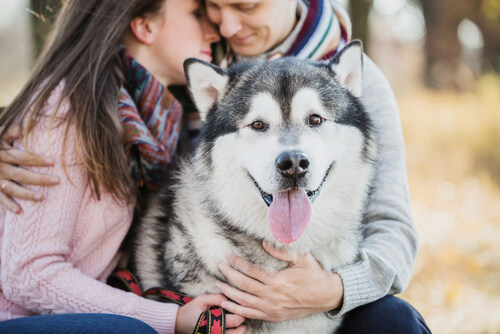5 Pieces of Advice to Prevent Cancer in Dogs

Thanks to the advances of veterinary medicine and good nutrition, dogs now live longer than ever. But since nothing is perfect, animals sometimes get sick. Today we are sharing some advice with you about preventing cancer in dogs, an illness that is no longer synonymous with incurable nor death.
Some information about cancer in dogs
In terms of types, cancer in dogs is not much different from cancer in humans. But it can spread more quickly than in people.
The most frequent types are:

- Bone cancer: It usually affects older dogs and large breeds. It’s one of the more aggressive types.
- Lymphoma: These are tumors in the lymphatic ganglion and can spread to the liver and the spleen.
- Skin cancer: The most common form are mastocytomas, which occur with ulcers and other skin lesions.
- Breast cancer: This represents approximately 50 percent of cancer that affect females. And it’s three times more frequent than in humans.
- Transmissible venereal tumors: It’s transmitted by licking, the nose and intercourse. It affects the mucous membrane of the sexual organs.
We are sharing some advice with you about preventing cancer in dogs, an illness that, detected in time today, may be curable.
Dogs breeds most prone to develop cancer
Dogs can have a genetic predisposition to cancer. There are also some breeds that have a higher chance of suffering from it. This is the case for:
- German Shepherds
- Pointers
- Springer Spaniels
- Boxers
- Golden Retrievers
- French Poodles
- Bernese Mountain Dogs
The probability increases when dogs come from a very small gene pool. This is why mixed breeds carry a lower risk of suffering from this cruel disease.
Some advice to prevent cancer in dogs
Physical activity and an adequate diet are always recommended to lead a healthy life. And this is just as important for dogs as it is for humans. But sometimes it isn’t enough and a cancer diagnosis strikes.
But remember that not every tumor is malignant. And, even if it were so, early detection and timely treatment always increase the chance for your furry friend to be cured or improve their quality of life.
Consequently we will share some advice that will help you to prevent cancer in your pet or, at the very least, detect it in time.
1. Spay or neuter your furry friend
If you get your female dog spayed, you will drastically cut the chances of her suffering from breast tumors. The reason for this is that there will be a smaller effect of reproductive hormones.
In addition, this operation frees the male dogs just as much as the female dogs from being infected by a venereal tumor, as the animals will stop having sexual contact.
But be very careful, if you go through with the operation before an animal has stopped growing, you can increase the risk that suffering from bone cancer.
2. Give your dog a healthy environment in your home
Cleaning products, insecticides and fertilizers usually contain carcinogenic elements. Watch what you’re using and how you’re using it. It’s also not good to smoke around your dog. Incidentally, you are taking better care of yourself.
3. Vaccines and deworming tablets, only the necessary ones
Don’t exceed the use of deworming tablets or flea collars, whether it’s inside or outside. And only give him the vaccines that he really needs. Everything in moderation.
4. Keep him far from stress
Stressful situations can trigger cancer in humans as well as in our furry friends. As such, don’t expose them to it or try to keep it to a minimum.
5. Pay attention to any sign that something is not okay

To detect cancer early in dogs, the best tool is, without a doubt, looking out for red flags. So even more than an annual check-up with the vet, observe your furry little guy. And take him quickly to a consultation if you notice the following warnings:
- Unusual smells in the mouth, nose or anus
- Nodules and other strange formations on the skin and the mucous membrane
- Sudden and unexplainable weight loss
- Loss of appetite
- Obvious and inexplicable changes in behaviors
- Problems breathing (couching, sneezing, difficulty breathing, etc.)
- Wounds that don’t heal
- Vomiting, diarrhea and frequent abdominal bloating
- Pale gums
- Mild bleeding of the sexual organs
This text is provided for informational purposes only and does not replace consultation with a professional. If in doubt, consult your specialist.